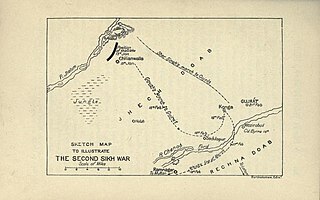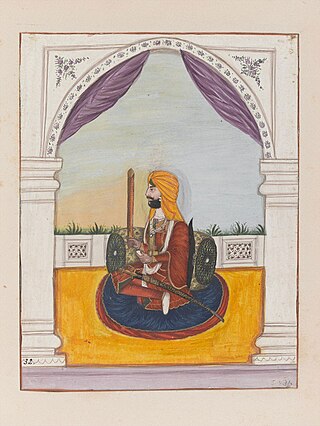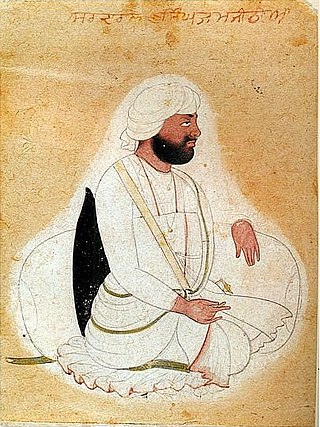
The first Anglo-Sikh war was fought between the Sikh Empire and the British East India Company in 1845 and 1846 around the Ferozepur district of Punjab. It resulted in the defeat and partial subjugation of the Sikh empire and cession of Jammu &Kashmir as a separate princely state under British suzerainty.

The second Anglo-Sikh war was a military conflict between the Sikh Empire and the East India Company which took place from 1848 to 1849. It resulted in the fall of the Sikh Empire,and the annexation of the Punjab and what subsequently became the North-West Frontier Province,by the East India Company.

The Sikh Empire was a regional power based in the Punjab region of the Indian subcontinent. It existed from 1799,when Maharaja Ranjit Singh captured Lahore,to 1849,when it was defeated and conquered by the British East India Company in the Second Anglo-Sikh War. It was forged on the foundations of the Khalsa from a collection of autonomous misls. At its peak in the 19th century,the empire extended from Gilgit and Tibet in the north to the deserts of Sindh in the south and from the Khyber Pass in the west to the Sutlej in the east. It was divided into four provinces:Lahore,which became the Sikh capital;Multan;Peshawar;and Kashmir from 1799 to 1849. Religiously diverse,with an estimated population of 4.5 million in 1831,it was the last major region of the Indian subcontinent to be annexed by the British Empire.

Maharani Jind Kaur was regent of the Sikh Empire from 1843 until 29 March 1847. After the Sikh Empire was dissolved on 29 March 1847 the Sikhs claimed her as the Maharani and successor of Maharaja Duleep Singh. However,on the same day the British took full control and refused to accept the claims.

The Battle of Aliwal was fought on 28 January 1846 between the British and Sikh forces in northern India. The British were led by Sir Harry Smith,while the Sikhs were led by Ranjodh Singh Majithia. Britain's victory in the battle is sometimes regarded as the turning point in the First Anglo-Sikh War.

Hari Singh Nalwa was the commander-in-chief of the Sikh Khalsa Fauj,the army of the Sikh Empire. He is known for his role in the conquests of Kasur,Sialkot,Attock,Multan,Kashmir,Peshawar and Jamrud. Hari Singh Nalwa was responsible for expanding the frontier of Sikh Empire to beyond the Indus River right up to the mouth of the Khyber Pass. At the time of his death,Jamrud constituted the western boundary of the Empire.

Maharaja Gulab Singh Jamwal (1792–1857) was the first Maharaja of Jammu and Kashmir and the founder of the Dogra dynasty. Originally a commander of the Sikh Empire,he sided with the British in the First Anglo-Sikh War and briefly became prime minister of the Sikh Empire in 1846. In the same year he signed the Treaty of Amritsar with the British,establishing the state of Jammu and Kashmir under the suzerainty of the British Raj;this treaty formalized the transfer of all lands that were ceded by the Sikhs to the British in the Treaty of Lahore.
Guru Nanak founded the Sikh religion in the Punjab region of the northern part of the Indian subcontinent in the 15th century and opposed many traditional practices like fasting,Upanayana,idolatry,caste system,ascetism,azan,economic materialism,and gender discrimination.

The Battle of Jamrud was fought between the Emirate of Afghanistan under Emir Dost Mohammad Khan and the Sikh Empire under Maharaja Ranjit Singh on 30 April 1837. Afghan forces confronted the Sikh forces at Jamrud. The garrisoned army was able to hold off the Afghans till Sikh reinforcements arrived to relieve them.

Diwan Mokham Chand was one of the chief commanders of the Sikh Empire. He conquered Attock from the Durrani Afghans in 1813 and subdued the Rajputs in the Hills of Himachal and in Jammu at Jasrota,Chamba,and Basroli. He also commanded one of the early Sikh expeditions to conquer Kashmir that ended in failure due to bad weather blocking the passes to the valley. Mokham Chand was born in a Hindu Khatri family.

Ranjodh Singh was a powerful member of the Sikh aristocracy and governor of Hazara. The Majithia family are Jat of the Shergill gotra (clan),and were particularly influential in the area near their headquarters in Majithia.
The Battle of Shopian took place on 3 July 1819 between an expeditionary force from the Sikh Empire and Jabbar Khan,the governor of the Kashmir Valley province of the Durrani Empire. It was the decisive battle during the Sikh expedition into Kashmir in 1819.

The Afghan–Sikh wars spanned from 1748 to 1837 in the Indian subcontinent,and saw multiple phases of fighting between the Durrani Empire and the Sikh Empire,mainly in and around Punjab region. The conflict's origins stemmed from the days of the Dal Khalsa,and continued after the Emirate of Kabul succeeded the Durrani Empire.

Lehna Singh Majithia,also romanized as Lahina or Lahna,was a polymath,inventor,warrior,and statesman. He had an interest in statecraft,architecture,mathematics,astronomy,firearms,mechanics,languages,art,and ordnance. Lehna Singh was the father of famous businessman and philanthropist,Dyal Singh Majithia.

Tej Singh was a Sikh commander in the Sikh Empire. He was appointed as commander-in-chief of the Sikh Khalsa Army during the First Anglo-Sikh War betraying the army he was supposed to lead.
Hukma Singh was the first governor of Hazara region in the Sikh Empire from 1814 to 1819,with headquarters at Attock. He was a Rajput of Chandravanshi Bhati.
The Battle of Mangal was fought between the Sikh forces led by Hari Singh Nalwa and the Jadoon,Tanaoli and Swati tribes led by Mahomed Khan,Bostan Khan and Najeebullah Swati.
The Battle of Taragarh was fought in 1822 by the Sikh forces led by Amar Singh Majithia and the Afghan tribesmen led by Mohammad Khan Tarain.
Diwan Ram Dayal was the governor of Hazara region in the Sikh Empire from 1819 until his death in 1820.

Desa Singh Majithia (1768–1832) was a Sikh jagirdar,military general,and statesman. He was perhaps one of the earliest Sikh patrons of artwork through the employment of Pahari artists during the period of 1810–30 when he served as governor of the hill states of the Punjab Hills. Desa served as a jagirdar from 1788 to 1832.













